
Student Spotlight: Tom Fuller, Garden Design
Tom Fuller has always had a love of the great outdoors and after leaving school went to a local specialist college to study Horticulture. A fair
As a not-for-profit foundation, we are so confident in the price of our Diploma’s that if you can find the same level of education for less, we will match it!

No previous qualifications required! Age 16+ and an interest & enthusiasm for garden design.

14 weeks of home study
including 20 x bi-weekly
online lectures (via Zoom)

15th September - 5th January
10am - 12.30pm (UK Time)
Wednesday & Monday

No exams!
Tutor assessment only
With twice weekly live Zoom classes, the Online Fast-Tracked Diploma combines the intensive pace of the ‘In-Studio Fast-Track’ Diploma and the convenience of the ‘Online Flexible’ Diploma. This 14-week course is ideal for those students wanting to study from home and speed up their learning in a live environment.
The Level 3 Diploma in Professional Garden Design provides you with the skills and qualification to work professionally as a garden designer… without having to go back to school full-time allowing you to balance the demands of work and family life.
The skills you’ll learn can help you carry out design projects for yourself or for family and friends, prepare you for work as a designer, or enable you to pursue further studies in the subject.
This course is Ofqual Level 3 accredited and globally recognised, meaning you can work legally as a garden designer or gain enough educational credits to study a Bachelors Degree if you so choose.

For students who want all the benefits of remote online learning, but are also looking for more structure and live interaction with tutors and peers, the ‘Online Fast-Track’ course offers an ideal mix.
Because the course is delivered fully online, it means students can study from anywhere in the world without the need to travel or commute and attend a full-time course. But it also adds the valuable element of live lectures online with tutors and other students, to cover key content and enable discussions.
You will study eight dedicated Units during this Professional Diploma
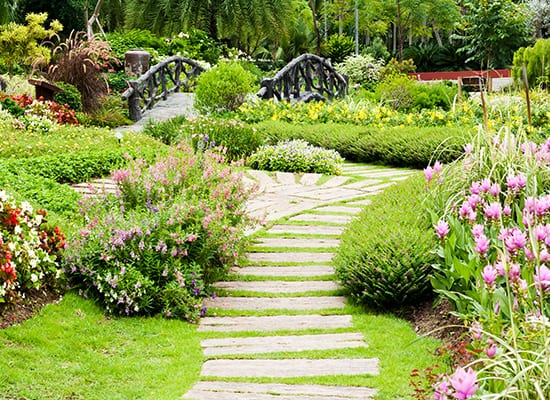
This unit introduces you to the purpose of garden design and the development of key garden design trends. In addition, it teaches you about the role and responsibilities of the garden designer and the main principles garden designers work with in the present day. This unit also includes:
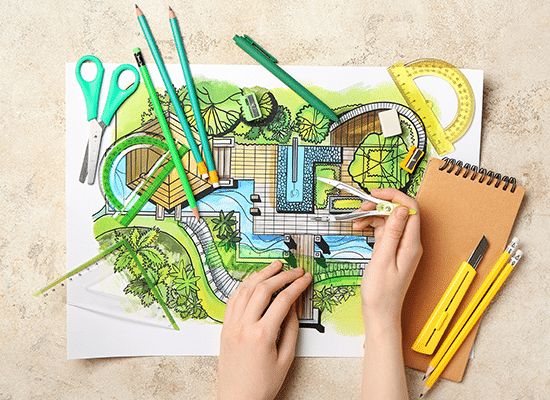
Within this unit, you will learn about the components that make up a garden, exploring core elements that are common within a successful design scheme. You will learn how these ingredients work together to influence the appearance, usability and function of a garden space. This unit also includes:
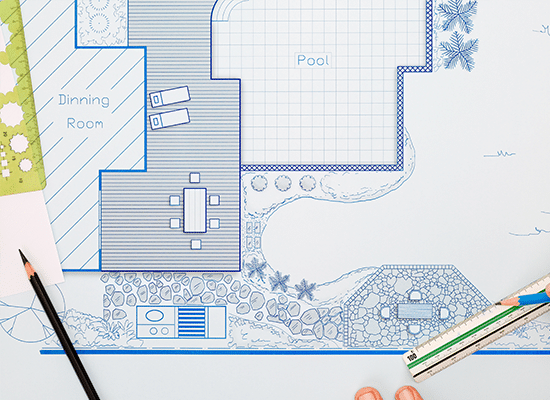
Within this unit, you will learn how to measure a garden space and draw it to scale. You will also learn how gather important information about the site and how this information will influence your garden design decisions. You will develop drawing skills and produce your own site survey plan. This unit also includes:
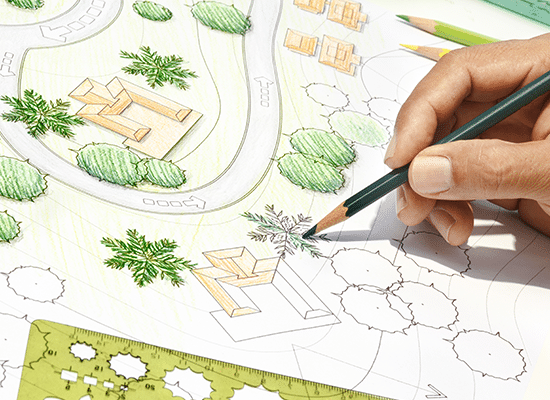
This unit will inspire your creativity by developing your garden design skills. You will develop spatial planning skills and explore innovative ideas related to the aesthetics and practicality of garden layout. You will learn how to produces sketches, technical plans and elevations, how to select your strongest designs in relation to client briefs, as well as how to present this information professionally to clients, trade or contractors. This unit also includes:
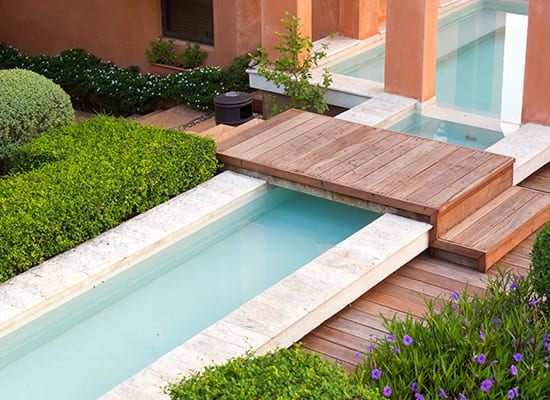
This unit focuses on products and materials for hard landscaping and water features, along with the items that provide the finishing touches to the garden space, such as furniture, lighting and accessories. You will explore products and materials for their practical, ethical, and aesthetic characteristics, making suitable choices for a garden scheme and presenting these to meet a client brief. This unit also includes:
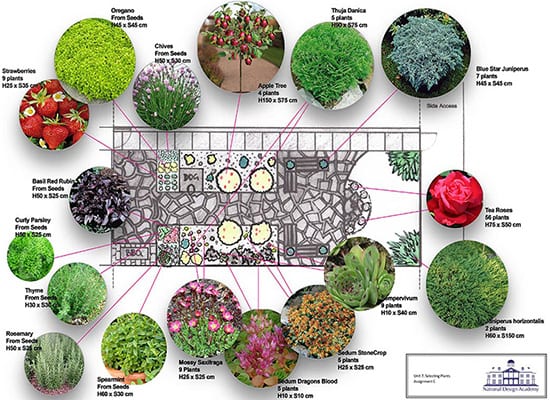
This unit will help you to understand plant biology, the environmental requirements of plants and the importance of selecting appropriate planting as part of your design. It looks at how you source your plants and the practical and aesthetic considerations to be considered when developing a planting plan to a design brief. In addition, you will learn how to present planting plans and specifications to a professional standard. This unit also includes:

This unit explores the wide array of creative and technical roles and diverse possibilities for professional engagement and career progression in this dynamic and competitive industry. It will help to prepare you to work successfully in the professional environment, whether for an established practice or setting up a garden design business. With a focus on your personal and professional development, you will consider the steps you should take to achieve your own progression ambitions. This unit also includes:
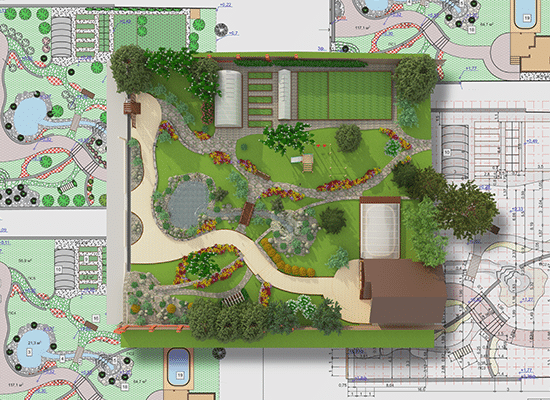
For the final unit of the course, you bring together all your newly learned skills by producing conceptual designs and a design pack to create a wonderful garden design for a new client. When complete, your work will form an asset to your developing portfolio to show future clients. This unit also includes:

This unit introduces you to the purpose of garden design and the development of key garden design trends. In addition, it teaches you about the role and responsibilities of the garden designer and the main principles garden designers work with in the present day. This unit also includes:

Within this unit, you will learn about the components that make up a garden, exploring core elements that are common within a successful design scheme. You will learn how these ingredients work together to influence the appearance, usability and function of a garden space. This unit also includes:

Within this unit, you will learn how to measure a garden space and draw it to scale. You will also learn how gather important information about the site and how this information will influence your garden design decisions. You will develop drawing skills and produce your own site survey plan. This unit also includes:

This unit will inspire your creativity by developing your garden design skills. You will develop spatial planning skills and explore innovative ideas related to the aesthetics and practicality of garden layout. You will learn how to produces sketches, technical plans and elevations, how to select your strongest designs in relation to client briefs, as well as how to present this information professionally to clients, trade or contractors. This unit also includes:

This unit focuses on products and materials for hard landscaping and water features, along with the items that provide the finishing touches to the garden space, such as furniture, lighting and accessories. You will explore products and materials for their practical, ethical, and aesthetic characteristics, making suitable choices for a garden scheme and presenting these to meet a client brief. This unit also includes:

This unit will help you to understand plant biology, the environmental requirements of plants and the importance of selecting appropriate planting as part of your design. It looks at how you source your plants and the practical and aesthetic considerations to be considered when developing a planting plan to a design brief. In addition, you will learn how to present planting plans and specifications to a professional standard. This unit also includes:

This unit explores the wide array of creative and technical roles and diverse possibilities for professional engagement and career progression in this dynamic and competitive industry. It will help to prepare you to work successfully in the professional environment, whether for an established practice or setting up a garden design business. With a focus on your personal and professional development, you will consider the steps you should take to achieve your own progression ambitions. This unit also includes:

For the final unit of the course, you bring together all your newly learned skills by producing conceptual designs and a design pack to create a wonderful garden design for a new client. When complete, your work will form an asset to your developing portfolio to show future clients. This unit also includes:
A sample of work completed by our talented garden design students
The 14 week course consists of a 8-week study period that covers each of the 8 subject units in the Diploma course, one unit per week. Also up to 4 ‘Independent Study’ weeks within the duration to allow students to complete assignments.
Study Week Course Schedule
Accreditation
At the National Design Academy, we fully believe in the importance of accreditation. After all, what value is there in investing time and money into a course if it doesn’t offer a recognized qualification? The Diploma course is accredited by AIM Qualifications, an independent accrediting body for UK courses, and is recognised globally. It offers a level-3 UK qualification that allows to you work as a professional garden designer or start your own garden design business.
There are two ways for UK students to pay for their Online Fast-Track Diploma:
There are two ways for International students to pay for their Online Fast-Track Diploma:
* Monthly payments include admin fee.
All International fees in US Dollars.
Alongside a computer and an internet connection, there is also essential and recommended design equipment and resources required to complete your NDA Course, the majority are available through the online NDA Art Shop at student prices!
Successful completion of your NDA Diploma provides a guaranteed place on one of our online BA (Hons) degrees, such as BA (Hons) Design for Outdoor Living, with a generous Progression Scholarship. Degrees are validated by De Montfort University (DMU).
For those who wish to continue their study at an on campus university, all NDA Professional Diplomas carry a UCAS tariff point value. You can top up any existing UCAS points you may have with points from an NDA Diploma.
Diploma in Professional Garden Design = 24 UCAS tariff points.
The NDA Diploma in Professional Garden Design is designed to help you start your own Garden Design business. Like the Diploma course itself, you can work flexibly for your clients around your family commitments and gradually expand your business.
Many of our Diploma students start their own business and study for their degree flexibly alongside their client projects.

Tom Fuller has always had a love of the great outdoors and after leaving school went to a local specialist college to study Horticulture. A fair

Baz Grainger was already highly successful in the fashion industry, working as Head of Apparel for Timberland, but something was nagging at him. After visiting the

The best way to find out what it’s like to study an adult education course is to ask someone who has done it! We love to
Hear what past and present students have to say about studying at the NDA
3rd March to 11th June 2025
1 hour Live Online Induction to the Virtual Learning Studio (VLS) and to meet your course Tutor before study weeks begin.
Monday 3rd March @ 10am (UK Time)
Garden Design & the Role of the Designer
2.5 hour Live Online Tutorial
Wednesday 5th March @ 10am (UK Time)
2.5 hour Live Online Q&A Session
Monday 10th March @ 10am (UK Time)
Garden Design Principles
2.5 hour Live Online Tutorial
Wednesday 12th March @ 10am (UK Time)
2.5 hour Live Online Q&A Session
Monday 17th March @ 10am (UK Time)
Exploring Site Surveys & Drawing Plans
2.5 hour Live Online Tutorial
Wednesday 19th March @ 10am (UK Time)
Self-study to complete assignments
Week commencing 24th March
2.5 hour Live Online Q&A Session
Monday 31st March @ 10am (UK Time)
Space Planning & Garden Design Development in a Professional Context
2.5 hour Live Online Tutorial
Wednesday 2nd April @ 10am (UK Time)
2.5 hour Live Online Q&A Session
Monday 7th April @ 10am (UK Time)
Hard Landscaping, Furniture, Lighting & Accessories
2.5 hour Live Online Tutorial
Wednesday 9th April @ 10am (UK Time)
Self-study to complete assignments
Weeks commencing 14th & 21st April
2.5 hour Live Online Q&A Session
Monday 28th April @ 10am (UK Time)
Planting Design
2.5 hour Live Online Tutorial
Wednesday 30th April @ 10am (UK Time)
Self-study to complete assignments
Week commencing 5th May
2.5 hour Live Online Q&A Session
Monday 12th May @ 10am (UK Time)
Professional Practice in Garden Design
2.5 hour Live Online Tutorial
Wednesday 14th May @ 10am (UK Time)
2.5 hour Live Online Q&A Session
Monday 19th May @ 10am (UK Time)
Professional Garden Design Project
2.5 hour Live Online Tutorial
Wednesday 21st May @ 10am (UK Time)
Self-study to complete assignments
Week commencing 26th May
2.5 hour Live Online Q&A Session
Monday 2nd June @ 10am (UK Time)
Ad-hoc Q&A sessions if required
3rd - 10th June
15th September 2025 to 5th January 2026
1 hour Live Online Induction to the Virtual Learning Studio (VLS) and to meet your course Tutor before study weeks begin.
Monday 15th September @ 10am (UK Time)
Garden Design & the Role of the Designer
2.5 hour Live Online Tutorial
Wednesday 17th September @ 10am (UK Time)
2.5 hour Live Online Q&A Session
Monday 22nd September @ 10am (UK Time)
Garden Design Principles
2.5 hour Live Online Tutorial
Wednesday 24th September @ 10am (UK Time)
2.5 hour Live Online Q&A Session
Monday 29th September @ 10am (UK Time)
Exploring Site Surveys & Drawing Plans
2.5 hour Live Online Tutorial
Wednesday 1st October @ 10am (UK Time)
Self-study to complete assignments
Week commencing 6th October
2.5 hour Live Online Q&A Session
Monday 13th October @ 10am (UK Time)
Space Planning & Garden Design Development in a Professional Context
2.5 hour Live Online Tutorial
Wednesday 15th October @ 10am (UK Time)
2.5 hour Live Online Q&A Session
Monday 20th October @ 10am (UK Time)
Hard Landscaping, Furniture, Lighting & Accessories
2.5 hour Live Online Tutorial
Wednesday 22nd October @ 10am (UK Time)
Self-study to complete assignments
Week commencing 27th October
2.5 hour Live Online Q&A Session
Monday 3rd November @ 10am (UK Time)
Planting Design
2.5 hour Live Online Tutorial
Wednesday 5th November @ 10am (UK Time)
2.5 hour Live Online Q&A Session
Monday 10th November @ 10am (UK Time)
Professional Practice in Garden Design
2.5 hour Live Online Tutorial
Wednesday 12th November @ 10am (UK Time)
2.5 hour Live Online Q&A Session
Monday 17th November @ 10am (UK Time)
Professional Garden Design Project
2.5 hour Live Online Tutorial
Wednesday 19th November @ 10am (UK Time)
2.5 hour Live Online Q&A Session
Monday 24th November @ 10am (UK Time)
Ad-hoc Q&A sessions if required
25th November - 12th December
Self-study to complete assignments & Christmas break
15th December - 4th January
UK students pay approximately 50% of the full course fee – the balance is funded by the UK Government’s Adult education budget (AEB).
The National Design Academy is the only design school to be able to offer this funding as our Diplomas are all fully accredited by AIM Qualifications.